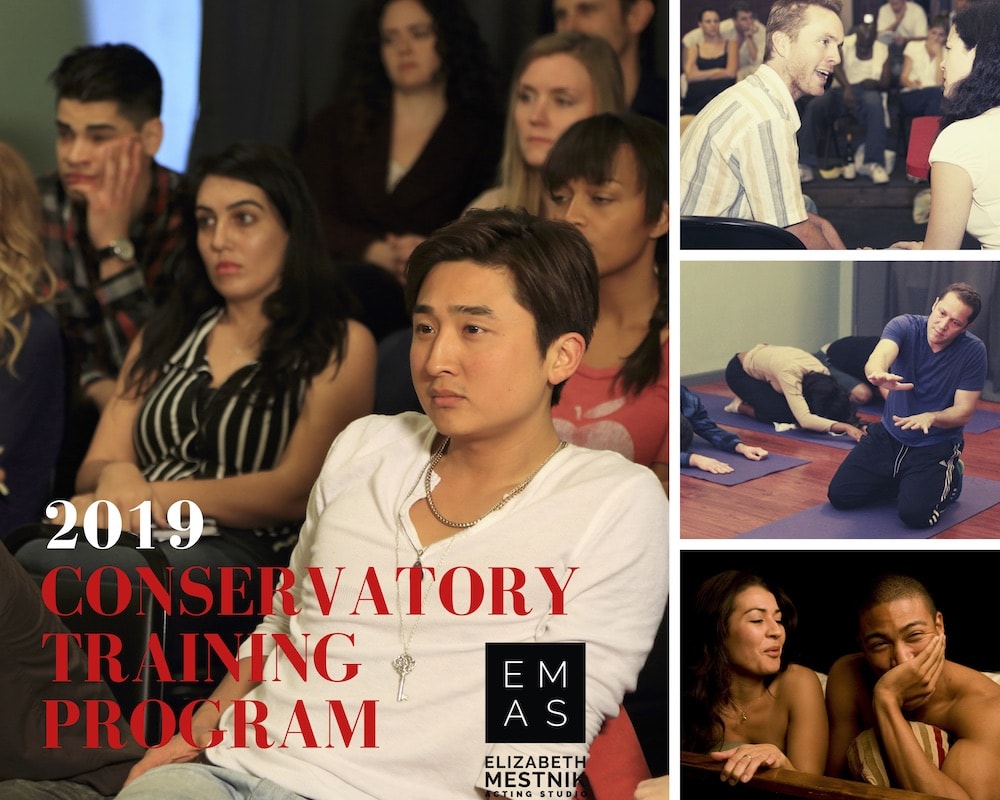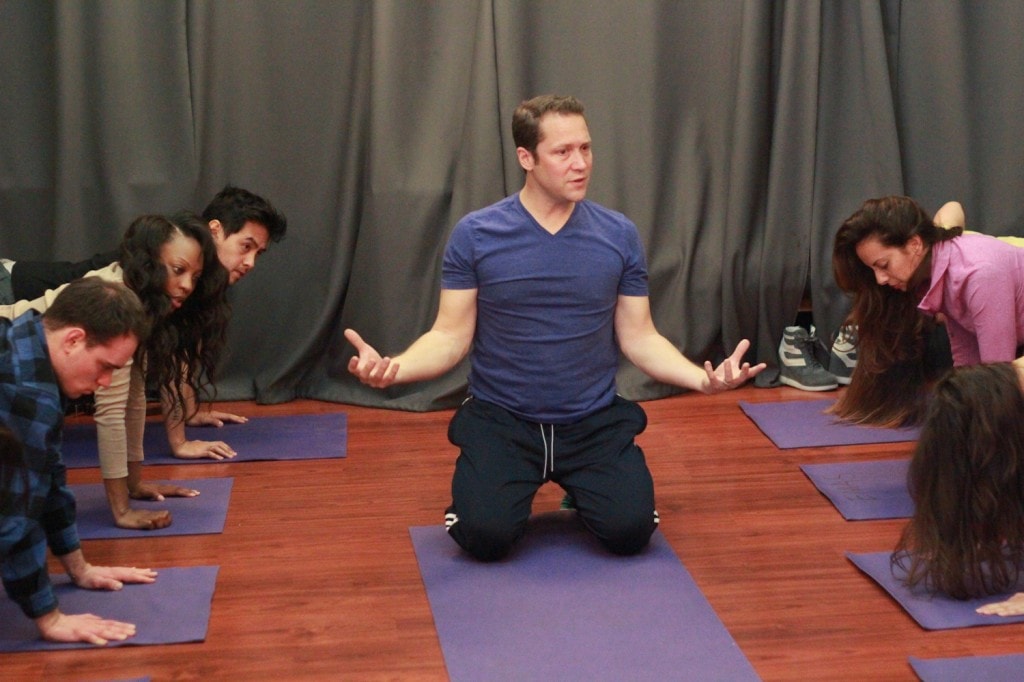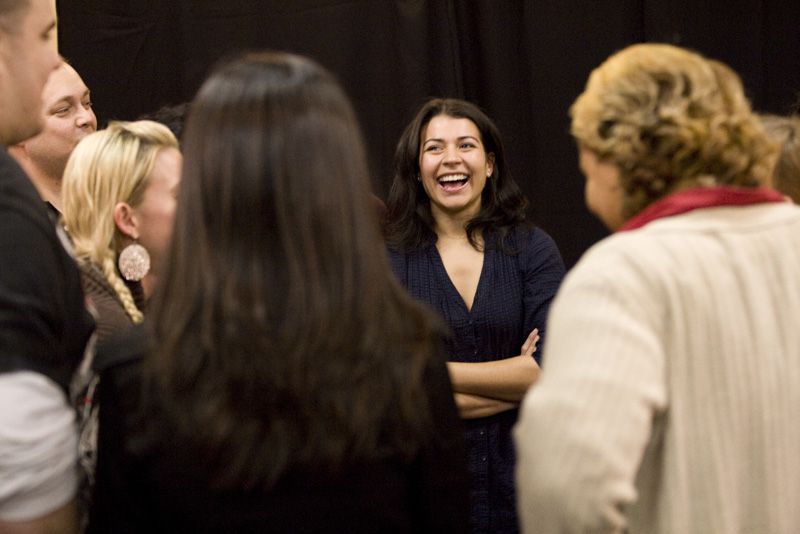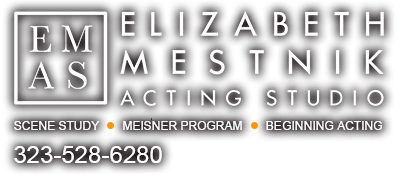Why EMAS’s Conservatory Training Program?
 I DO NOT WANT YOU TO GO INTO DEBT!
I DO NOT WANT YOU TO GO INTO DEBT!
DO YOU HEAR ME?
I HAVE SEEN TOO MANY TALENTED ACTORS LEAVE EXPEN$IVE BFA/MFA OR LOCAL CONSERVATORY PROGRAMS with so much debt they never have the chance to really pursue an acting career. Why? Because they became slaves to their “survival job”. Their loans came due and they couldn’t take the low or no paying opportunities that would give them performance experience and build a resume. They were exhausted and lacked the time to prepare for auditions and got out of creative shape.
I DO NOT WANT THAT TO BE YOU!
That is why EMAS is excited to offer this world-class actor training right here in the heart of the entertainment industry but literally for a third of the price. At the Elizabeth Mestnik Acting Studio we offer complete actor training with some the most highly trained teachers in Los Angeles. We know that each actor’s dream hinges on a mastery of the craft, self exploration and a relentlessly truthful instrument. Our Conservatory Training Program offers Voice, Speech, Movement, Shakespeare and Business/Life skills classes that augment our central Meisner Technique Acting Classes.
We have been offering these acclaimed acting classes for years. This is the first year we are bundling them together for a Conservatory Curriculum.
The Elizabeth Mestnik Acting Studio has been ranked as one of LA’s top acting programs by
The Los Angeles Times
backstage
CBS
For us, it’s all about the training, not the bells and whistles. Why will someone hire you? Because you are great at what you do. So when we sat down and worked out the numbers – we really didn’t understand why a year of professional training in Los Angeles should cost you $17,000- $25,000 (not including living expenses). We have put together a thorough 19 hour/week curriculum that will cost you only $7600
Read more and apply for our Fall 2019 program here.
Summer Acting Conservatory Program 2019

This Summer, EMAS is offering a unique opportunity to immerse yourself in your craft through our Summer Conservatory program. This program bundles four of our acting workshops with the goal of helping you to develop the tools to take the next step in your acting career.
If you’re interested, please call us at 323-528-6280 or email [email protected] for more information and to schedule an interview.
1) SUMMER MEISNER TECHNIQUE INTENSIVE
When: JUNE 27– AUGUST 1, 2019
Session A: Monday & Wednesday and Saturday mornings at 10am
Session B: Tuesday & Thursday nights at 7pm & Saturday afternoons at 2pm
If you are ready to ignite your imagination, reconnect to your emotions, trust your instincts and develop the essential skills of great acting, and work harder than you have ever worked before…
This program is for you!
Read more about the Meisner Technique.
♦♦♦
2) Animal Work Movement Workshop
When: Friday June 14th. @7-9pm, Saturday June 15th & Sunday June 16th @10 am- noon
Over the course of three days Caitlin will be taking you through movement/body exercises that will help you to build a deeper physical characterization of any role. It will deepen the understanding of the character as well as allow for you to have an open instrument through which behavior can be revealed. You will discover how it is that your animal moves through space, how it accesses sound, and truly identify their five senses. This is a fantastic way to create non-cliché, unpredictable, instinctive character choices that will set your acting choices apart.
♦♦♦
3) Introduction to Williamson Movement Technique:
When: June 24th – July 29
Mondays — 2pm to 4:30pm
Using the fundamentals of the Williamson Technique, this class functions as a physical guide to help begin to identify your own unique habits of tension and to begin to let go of extraneous physical behavior. This technique was specifically designed for the actor studying The Meisner Technique, to integrate the philosophies and techniques of Meisner training into the body and voice. In doing so, you will become less physically cluttered, less self-conscious, and more capable of creating specific, unapologetic behavior with ease.
♦♦♦
4) Introduction to Fitzmaurice® Voicework
When: July 10th – July 31s
Wednesdays 2 – 5pm
This class allows students to learn about the basic format and tenants of this effective voice technique. Fitzmaurice® Voicework is designed to let your body and voice work with freedom and full expression to access your creativity and emotional range. This 4- week workshop will introduce students to the ideas of de-structuring and re-stucturing as well bring attention to their own personal blocks and tensions in the work.
Read more about Fitzmaurice Voicework®.
Announcing: Introduction to The Williamson Technique

Introduction to The Williamson Technique (Level 1); A movement workshop for actors with Caitlin Rigney
THIS IS A NECESSARY PART OF YOUR WORK.
The BENEFITS for your ACTING and LIFE are tremendous.
Work to get rid of TENSION, get to know and live in your BODY. Make friends with it and don’t let it limit your experience or acting. Your relationship to that work and your body is ONGOING, so even for those who have done movement in the past, we strongly recommend continuing that exploration with Caitlin and this work.
It is imperative that you work on all areas of your instrument, including your vital voice and body. Many of you may have worked in other techniques with specific focuses on voice and/or body. This technique was specifically designed for the actor, to integrate the philosophies and techniques of Meisner training to the body and voice. Making yourself open, present, and available to what is going on around you – and translating that into instinctive behavior.
When:
Starts Monday June 24th for 6 weeks
Mondays — 2pm to 4:30pm
Enrollment Fee: $280
Where:
EMAS
11423 Moorpark St
North Hollywood, CA 91602
Register: www.emasla.com/registration
Announcing: Summer 2019 Fitzmaurice® Voice Workshop

Enrollment is now open for EMAS’ Summer 2019 Fitzmaurice Voicework class.
Taught by Dr. Michael Yurchak, this introductory class allows acting students to learn about the basic format and tenants of this proven, effective voice technique.
When: Wednesdays at 2pm
Cost: $180. Deposit of $90 required for registration.
Register at: www.emasla.com/registration
More Info: 323-528-6280
Animal Work Acting Workshop

Presents:
Animal Work Acting Workshop
Exploring your character through Animal Work.
Over the course of this three day acting workshop, Caitlin will be taking you through movement/body exercises that will help you to build a deeper physical characterization of any role. This is a fantastic way to create non-cliché, unpredictable, instinctive character choices. It will deepen the understanding of the character as well as allow for you to have an open instrument through which behavior can be revealed. You will discover how it is that your animal moves through space, how it accesses sound, and truly identify their five senses.
Both the scene and the animal you would like to work with is your choice (best if it is something you have worked on in the past). Caitlin will ask you to really sit with the character and daydream on what type of animal you trust your character is. And to then email her letting her know the scene in which you are working on, your character and the animal you will be exploring in the workshop. Your animal may even change after the first class and that is absolutely okay.
Class size is limited to 14 students to maintain one-on-one instruction.
When:
Friday June 14th. @7-9pm
Saturday June 15th and Sunday June 16th @10 am- noon
Location:
Elizabeth Mestnik’s Acting Studio @ 11423 Moorpark Street
Instructor: Caitlin Rigney
Fee: $110
Register at www.emasla.com/registration
Announcing: Level 2 On Camera Technique Class

Presenting:
On Camera Technique Class – Level 2
July 10 – August 21, 2019
Available to all who have graduated from EMAS Professional Meisner Program and those who have taken On-Camera Technique 1
For the actor committed to successful film and television auditioning.
There are no scene partners, there are no excuses – this work is all you – on camera.
In Level 2 On Camera Technique, we delve more deeply into:
- Scene structure and how to tell the story and find an effective “button” to the scene.
- Creating an opening moment
- The importance of your eyes and eyeline and how to use them
- Understanding the playing space and stillness and how it improves your game
- Taking control of the audition room
- How to handle physicality like a fight, eating, or a kiss in an audition
- How to handle the callback
With the majority of all auditions for television and film requiring that the actor be put on camera for the casting director and/or producers to review, today’s working actor must possess a solid camera technique that is specific to the audition format. In this course strong cold-read and on-camera skills are developed as well as an empowered perspective of the casting process and a clear understanding of what it truly means to “own” the room.
WHEN: 7 Wednesdays @ 7:00pm
LOCATION: EMAS 11423 Moorpark Street, Studio City
TUITION: $380 ($200 deposit required to hold spot)
REGISTRATION: https://www.emasla.com/registration/
QUESTIONS: 323-528-6280
INSTRUCTOR: Thom Rivera
Meisner Brush Up Class: Begins Summer 2019

We are calling it Meisner Brush Up class. Essentially it’s an 8-week review class that will help get you back on your impulses and taking those big emotional risks that you were doing in our 2nd year of Meisner Technique training. The syllabus will really work those skills of listening and taking things personally, crafting for the highest stakes, as well as justifications, impediment and point of view work. You know, all the work that really made you feel like you could conquer anything.
We developed this program because we know how invaluable the tools you developed during your training are, and how gloriously unpredictable it is to take off the mask and really be with another human being in the moment through the entire span of emotional circumstances. It has been built understanding that the world of auditioning can sometimes shrink your range and this is here to help you really swing for the fences in regards to your crafting.
Please note this class is tailored specifically for actors with prior training in the Meisner Technique.
What: Summer Workshop for EMAS alums
Where: 11423 Moorpark Street, Los Angeles (Elizabeth Mestnik Acting Studio)
When: MONDAYS AT 7PM
Tuition: $380
Instructors: EMAS FACULTY
Contact: Call us at 323-528-6280 or fill out the appropriate form on our Registration Page.
Video: Shakespeare’s Relevance to the Modern Actor
EMAS faculty member, Diana Jelinek shares what studying Shakespeare means to her and how it is relevant to the modern student of the Meisner Technique.
Read more about our upcoming LA Shakespeare classes.
Stage, Film and Television: Differences for the Beginning Actor

There are three major platforms for actors: stage, film and television. Decades ago, it was relatively rare for actors to successfully crossover between these mediums. Instead, most actors would establish themselves on the boards or before cameras and largely stay in their lanes for the rest of their careers. However, those days are long gone, and many actors move freely between mediums, enjoying the unique artistic experiences each one provides.
That said, every actor needs to begin somewhere, so here is a guide to help new actors understand the major differences between working in stage, film and TV and which medium, or mediums, might appeal to them most.
Location
New York and Los Angeles are the two main acting meccas in the U.S., but they have little in common other than their thriving entertainment industries. The weather, culture, rent prices, transportation systems and professional opportunities in each city are very different, and actors should consider which location fits their personality and career aspirations before booking a plane ticket and signing a lease.
Stage
The Big Apple is the unrivaled king of stage, with more than 40 theatres on Broadway alone. While there are plenty of stage opportunities in L.A., New York’s storied theater scene still isn’t rivaled on the West Coast.
Film
The City of Angels is the center of the film universe, and actors who aspire to a film career will find the most opportunities there by far. However, New York is a good secondary location for film hopefuls who prefer the vibe of the East Coast.
Television
Again, L.A. is the most desirable location for actors who dream of breaking into television, but many TV dramas film in New York as well. Also, cities like Vancouver, Toronto, Chicago and Atlanta have strong television production industries, and actors may feel more at home in these locations than L.A. depending on proximity to their family, work and more. However, L.A.’s pilot season will draw most TV hopefuls to the the city at least once a year due to the volume of casting that takes place.
Audience
Stage
Theatre actors play in front of a live audience, which greatly impacts their performance. Patrons in the back row cannot hear quietly read lines or see subtle expressions or gestures, meaning an actor must put on a performance large enough to fill the space (often larger than life). Stage audiences also give live feedback, which actors can feed off of, both for the good and for the bad.
Film
Cinemas have massive screens and top-notch sound systems, which means the slightest facial expressions and softest whispers can be seen and heard by film audiences. As a result, film acting offers a platform for very nuanced performances – the smallest bit of overacting is difficult to overlook when amplified by cameras, microphones, lighting (not to mention the score and digital effects). Actors also have to wait months, or sometimes years, to see an audience’s reaction to their work, which can look much different than they expected due to editing and other post-production additions.
Television
Over the past couple of decades, television has become much more like film in terms of its acting requirements. Movie-quality production values paired with big screen TVs mean that many television projects need the same less-is-more approach to acting that film requires. Unless a show is filmed before a live audience, which is increasingly rare, TV actors also typically wait months to experience an audience’s reaction to their work, which can feel isolating.
Schedule and Pace
Stage
Actors working in theatre productions usually go through substantial rehearsal periods that allow them to familiarize themselves with their character, thoroughly learn their lines and bond with other cast members. Once the production goes live, they get the chance to perform their role multiple times, growing and learning with each performance.
Film
Although dependent on a movie’s budget, production schedule and director, most film actors may get little or no dedicated rehearsal time with the rest of the cast. They also work notoriously long hours that can start at odd times and be filled with lengthy periods of downtime between scenes. Some movie productions can also require actors to go on location for weeks or months, which can be exciting but can also cause lifestyle disruptions.
Television
TV actors tend to work at a much quicker pace than film actors do, with several pages of script going before cameras each day. They also generally work fewer, and more regular, hours than their film counterparts. Sitcoms, in particular, are known for having comfortable shooting schedules that allow actors more personal time.
Material
Stage
Because of theatre’s repetitive nature, stage actors get extremely familiar with their characters and the script as a whole. The most successful plays and musicals require acting companies to put on hundreds of performances each year, and audiences can become attached to certain portions of the dialogue, meaning that mistakes aren’t easy to hide and improvisation is impossible. Some actors love this familiarity, while others may become bored after a while.
Film
In general, film allows actors much more creative freedom than stage productions. Depending on the goals of the script and the personality of its director, a film role could demand that an actor stick strictly to the written page or improvise huge parts of the script. However, in general, there will be limited changes to a film script once production begins and actors will usually have ample time to prepare for each day’s shoot.
Television
Unlike film actors, TV actors get to spend several episodes, and sometimes several seasons, exploring their characters. While the director is king in film, TV is a writer’s medium, and an actor’s ability to influence the direction of his or her character varies greatly depending on the needs and personality of the showrunner, who is often the head writer. TV scripts also tend to be written fairly close to an episode’s filming dates, so it’s common for actors to be presented with line changes on the day a scene is shot.
Each actor is different and may enjoy different acting platforms. However, the only way for an artist to truly know what he or she likes, and understand where his or her greatest talents lie, is to embrace new opportunities and give every acting medium a try.
An Introduction to LA Pilot Season for Actors

Pilot season in Los Angeles is a bit like the holiday season everywhere else: Some people are celebrating, some people are depressed and everyone is spectacularly stressed. However, instead of trying to find the perfect gift to put under the tree, showrunners and casting directors are searching for the perfect actors for their casts and TV networks are looking for the perfect shows to add to their schedules.
What, Where and When Is Pilot Season?
For decades, pilot season has been the wheel that keeps L.A.’s television industry turning. Each summer, writers and producers pitch hundreds of TV show ideas to major television networks and, of those, TV executives order around 70 pilot scripts to be written. Of those 70 scripts, around 20 will go before cameras to become pilot episodes. It is those 20 or so pilot episodes that create a casting feeding frenzy between the months of January and April.
While there are major television production hubs in other North American cities, such as Atlanta, New York, Toronto and Vancouver, the center of the pilot season universe is still L.A. Even if a show’s production is based in one of those other cities, some or all of the casting will take place in the City of Angels.
What About Netflix, Amazon, Hulu and Other Streaming Networks?
There is no question that Netflix and other streamers have significantly changed the game in Hollywood. The most obvious change has been the way streaming networks order their programming. Instead of taking pitches and ordering a script or pilot episode, Netflix takes pitches and greenlights an entire series. For a while, Amazon took a different approach, ordering a handful of pilots and letting subscribers vote on the ones that would move to production. However, Amazon officially dumped that model in early 2018 and is now orders full series just like Netflix.
Some have wondered if these full-season orders would shortcircuit the traditional pilot season, but, for now, major broadcast networks like ABC, CBS, NBC, FOX and CW still use this model to cast their shows. Until that changes, pilot season will continue to be a massively important event on every actor’s yearly calendar.
To help get actors ready, here are some tips for surviving the 2019 pilot season.
How to Surive L.A.’s Pilot Season
1. Have representation
Actors must have an agent. Period. During pilot season, casting agents see literally thousands of auditions and self-tapes from represented talent. They do not have time to see unrepresented actors, so actors shouldn’t waste their time attempting to defy the odds. They should spend their time getting an agent.
2. Know when to go
Actors who are already in L.A. and have representation are ready to dive in and hit the audition circuit. However, actors based in Toronto, London, Sydney or even Peoria need to lay down solid groundwork before hopping on a jet. They need representation, work papers and, most of all, a way “in.” That means that they’re coming off a hot project that will open doors for them or they (or their representation) have pre-existing relationships with L.A. casting agents. If not, they should consider doing self-tapes for a season or three. A self-tape can get an actor called into the room, giving them that coveted way “in” and make the cost of travel worth it.
3. Understand the calendar and the casting pyramid
Networks are almost always looking for name actors to headline their new series, and these parts are typically the first ones cast. Next to be cast are the supporting roles, which will largely be filled by working actors with long resumes. However, there is some wiggle room here, and that’s where the opportunity lies for lesser-known actors. As February turns into March turns into April, the casting room door opens wider and wider. This is the time of year when most of the big fish have been landed and casting directors are desperate to find the right people for the last remaining roles. This is when actors are more likely to land the break they’re looking for. Get in the room, and anything can happen.
4. Prepare well, and leave it on the floor
Actors should read their sides, learn their lines, and then do what they were meant to do: Act. Auditions can be stressful and scary, but they give actors an audience to practice their craft in front of, and they should fully embrace that opportunity. They should know what they want to do with the character, but they should be loose and adaptable enough to play off their scene partner (if they have one) and take direction from the room. Whatever happens, they should leave knowing that they gave it their best shot and they now have more experience under their belt.
5. Don’t compare
Actors will have many friends that book pilots or other TV work before they do. They will also walk into audition waiting rooms and see other actors who are younger, older, fitter, better looking or seemingly more qualified than they are. It does no good for actors to compare themselves to others. As trite as it may sound, each person has unique talents, and the only thing an actor can do is learn their craft, prepare for each potential part and do their very best on the day of the audition. The rest is out of their hands.
6. Don’t forget about other opportunities
Yes, pilot season is the biggest event of the year, but it is also the second half of the traditional broadcast television season. Even if an actor doesn’t land a pilot, he or she can book work on existing TV series. In addition, thanks to Netflix, Amazon and cable, the mold for the traditional broadcast season was broken years ago. All platforms, including the major broadcast networks, are casting series all year long. Actors who land small roles on a fourth- or fifth-year series can use that experience to land bigger gigs, including pilots, in the future.
7. Don’t despair
The television industry is tough for 99 percent of actors. It’s tough to break into, and it’s tough to sustain a career in. Some degree of failure is inevitable. However, just because an actor botches an audition or fails to land a part, it doesn’t mean they aren’t good at what they do. It also doesn’t mean they should throw in the towel. So many successful actors have had a moment, or many moments, when they thought they should give up, move home and get a “real job.” Many have toiled for years as waiters or cashiers before they became “overnight successes.” As the recent viral story about former “The Cosby Show” regular Geoffrey Owens proved, many actors have had to get second jobs even after consistently working in the industry for years. Actors shouldn’t quit because they feel discouraged; they should only quit if they no longer love acting.
7. Join an Acting Class
This might sound self serving, but that doesn’t mean it’s not good advice! EMAS is only one of several excellent acting studios in the LA area. Taking classes offers you a chance to play an active role in progressing as an actor, an empowering experience in an industry where luck, timing and factors that are largely out of one’s control can seem to play an outsized role, particularly in the beginning.
In addition to the inherent value of growing as an actor, studying with a group of like-minded, similarly driven actors creates an excellent peer group for actors who may not yet have established themselves socially or professionally in LA.
8. Remember to enjoy life
Just like every other career, acting isn’t everything. Family, friends, pets, nature, exercise and hobbies are critically important and shouldn’t be neglected while an actor pursues his or her dream of booking a pilot. Not only can a life outside of the entertainment business bring an actor joy and keep them grounded, but it can expand their breadth of life experiences and help make them a better actor. Being happy and well-rounded is the best thing an actor can do for their mental health and their career.



